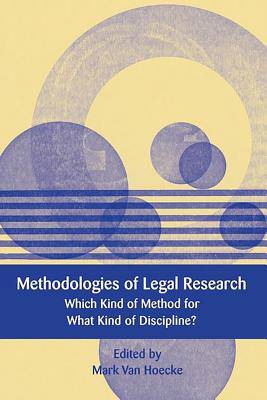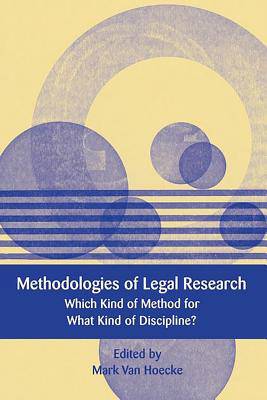
Bedankt voor het vertrouwen het afgelopen jaar! Om jou te bedanken bieden we GRATIS verzending (in België) aan op alles gedurende de hele maand januari.
- Afhalen na 1 uur in een winkel met voorraad
- In januari gratis thuislevering in België
- Ruim aanbod met 7 miljoen producten
Bedankt voor het vertrouwen het afgelopen jaar! Om jou te bedanken bieden we GRATIS verzending (in België) aan op alles gedurende de hele maand januari.
- Afhalen na 1 uur in een winkel met voorraad
- In januari gratis thuislevering in België
- Ruim aanbod met 7 miljoen producten
Zoeken
Methodologies of Legal Research
Which Kind of Method for What Kind of Discipline?
€ 45,95
+ 91 punten
Omschrijving
Until quite recently, questions about methodology in legal research have been largely confined to understanding the role of doctrinal research as a scholarly discipline. In turn, this has involved asking questions not only about coverage, but fundamentally, questions about the identity of the discipline. Is it (mainly) descriptive, hermeneutical, or normative? Should it also be explanatory? Legal scholarship has been torn between, on the one hand, grasping the expanding reality of law and its context, and, on the other, reducing this complex whole to manageable proportions. The purely internal analysis of a legal system, isolated from any societal context, remains an option and is still seen in the approach of the French academy. But, as law aims at ordering society and influencing human behavior, this approach is felt by many scholars to be insufficient. Consequently, many attempts have been made to conceive legal research differently. Social scientific and comparative approaches have proven fruitful. However, does the introduction of other approaches leave merely a residue of 'legal doctrine, ' to which pockets of social sciences can be added, or should legal doctrine be merged with the social sciences? What would such a broad interdisciplinary field look like and what would its methods be? Now available in paperback, this book provides answers to such questions. (Series: European Academy of Legal Theory - Vol. 9
Specificaties
Betrokkenen
- Uitgeverij:
Inhoud
- Aantal bladzijden:
- 310
- Taal:
- Engels
- Reeks:
- Reeksnummer:
- nr. 9
Eigenschappen
- Productcode (EAN):
- 9781849464994
- Verschijningsdatum:
- 23/05/2013
- Uitvoering:
- Paperback
- Formaat:
- Trade paperback (VS)
- Afmetingen:
- 156 mm x 234 mm
- Gewicht:
- 444 g

Alleen bij Standaard Boekhandel
+ 91 punten op je klantenkaart van Standaard Boekhandel
Beoordelingen
We publiceren alleen reviews die voldoen aan de voorwaarden voor reviews. Bekijk onze voorwaarden voor reviews.








